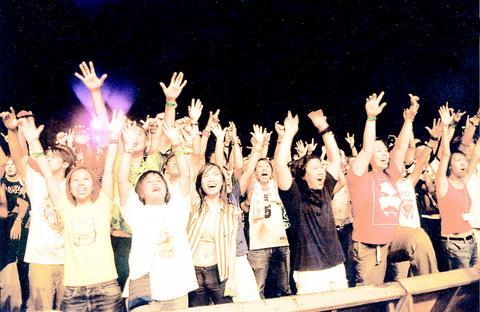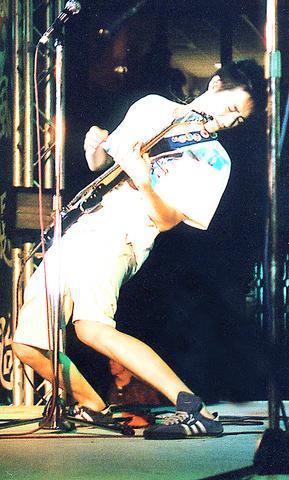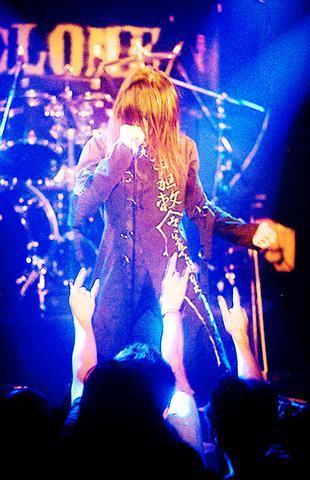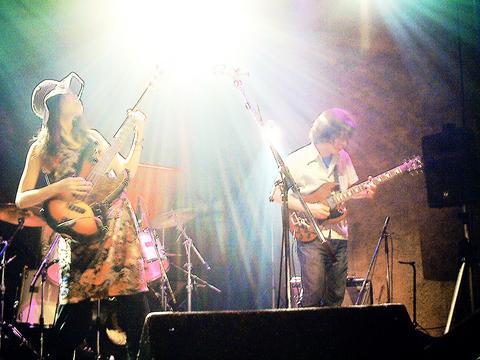To the casual observer, Taiwan must look like one rockin' island. First, Ho-Hai-Yan warmed a crowd of tens of thousands with a free concert at Fulong Beach and now revelers are priming themselves for the second three-day rock festival in as many weeks with Formoz 2003 (野台開唱).
Its name in Chinese translates as something like "wild stage concert" and comes from the performances in front of temples, at night markets and on street corners throughout Taiwan ever since there have been temples, night markets and street corners.
Those shows are marked by their impromptu spirit and happily mix all kinds of entertainment, musical or otherwise. For Formoz, though, the name is a bit of a deceit; the concert is anything but impromptu and Taiwan Rock Alliance (TRA) has been organizing this year's festival almost since the curtain fell on last year's, garnering sponsorship from every corner of the private and government sectors.

PHOTO COURTESY TRA
That support will amount to very little, though, if Taiwan's rock fans don' t come out for a second full weekend of damaging decibels, which is a concern considering this weekend's fare isn't free. One attendee to last week's beachside battle of the bands summed up what the organizers of Formoz are likely most afraid of.
"You have to pay to go to Formoz," said Amanda Chen. "Besides, it's all really hard rock. I'm not in to it that too much."
For their part, the folks at TRA are working to rid Formoz of its reputation as a head-banger's ball ? sort of.

PHOTO COURTESY TRA
"We've invited more alternative and hip-hop acts this year," said Freddy Lin (佛來敵), the 27-year-old head of TRA and perhaps the island's highest-profile head-banger. His own band, Chthonic (閃靈 ), is one of the few local rock acts to break into the international market, having been invited to tour Japan, and Freddy himself has been organizing a yearly concert for nine years. This is the third year that that annual outing has gone under the Formoz banner.
"Ho-Hai-Yan was a lot of unproven bands. What we're doing is different; most all the bands playing Formoz are established acts. And few of them are metal bands, as in past yeard."
In fact, unlike Formoz's inaugural year, when TRA broke the bank to invite Megadeth, Biohazard and Yola Tengo, this year's line-up of overseas invitees includes far less leather and long hair, such as Japanese post-rock duo Sugar Plant, hip-hop mix masters MP Family from South Korea, and a slough of Hong Kong acts, including Mazer, Fat Job, Ling Lychee and Very Ape. About the only metal lining the list of imports comes from Singapore; Impiety, whose song list consists of cult classics like Magikonsecration Goatsodomy and Paganistic Bitchgoddess Deimpalation.

PHOTO COURTESY TRA
Japan's Exias-J is also making its sophomore appearance at Formoz. The group's name stands for Experimental Improvisers' Association of Japan. It was founded in 1999 by Kondo Hideaki and is a collective of improv Jazz musicians whose passions lie in challenging the definition of music. Their sound ranges from modern Jazz to noise.
A few of the overseas acts, such as US punk revivalists Strike Anywhere, pulled out early due to SARS concerns, while others simply decided not to come. "Emo-rock" crooner Johnny Royale, who is said to make his audiences cry with his emotive brand of rock and roll, will stay in Hong Kong.
Formoz fans aren't likely to cry over their absence as a host of local favorites are slated to take to one of the festival's four stages between Friday and Monday.

PHOTO COURTESY TRA
Tizzy Back will be making their Formoz debut after getting a boost as the winners of last year's Ho-hai-Yan battle of the bands -- as will this year's winner, Monkey Insane (潑猴), who will tilt the scales with their own brand of metal. Other metal acts making the scene, in addition to Freddy's own Chthonic, are the Japanese-influenced Seventh Symphony (第七樂章 ), Sepulchre (天使之墓), 666 and several others. So much for it not being a head-banger's ball.
Of course, with nearly 40 hours of music on four stages, there'll be something for most every musical palette.
Among the softer side of local favorites will be Backquarter (四分衛), We Save Strawberries (草莓救星), Virgin Wiky, Relax One (輕鬆玩) and the Clippers (夾子 ), who remain hugely popular in Taiwan's underground music scene despite having released only one album in eight years.
"A lot of people are excited about the reunion bands that will be playing," said TRA's Doris Yeh (葉湘怡 ), referring to Ladybug (瓢蟲), MC Hotdog and others that have reformed to play this year's Formoz after having called it quits to pursue more "legitimate" careers or because they were drafted into the army, as was the case with MC Hotdog, who will be joining up with Dog G (大支) for the first time for a reunion gig that is sure to draw a crowd.
So despite their desire to have Formoz seem like a "wild stage" of extemporaneous entertainment, Freddy and his TRA staff have accomplished quite a feat in bringing together more than 100 bands; some from other countries, some from beyond the grave.
Asked if everything is ready for the weekend, Freddy, Doris and a third staffer at TRA's office look for a moment like those three monkeys that can neither see, hear nor speak any evil.
"We're just going through last-minute checks to see what there is left to do," says Freddy.
"I haven't heard of any big problems yet," Doris says. The third staffer rolls her eyes, shakes her hear then continues typing frantically at her computer. Maybe Formoz is a little more impromptu than it seems.

Taiwan has next to no political engagement in Myanmar, either with the ruling military junta nor the dozens of armed groups who’ve in the last five years taken over around two-thirds of the nation’s territory in a sprawling, patchwork civil war. But early last month, the leader of one relatively minor Burmese revolutionary faction, General Nerdah Bomya, who is also an alleged war criminal, made a low key visit to Taipei, where he met with a member of President William Lai’s (賴清德) staff, a retired Taiwanese military official and several academics. “I feel like Taiwan is a good example of

March 2 to March 8 Gunfire rang out along the shore of the frontline island of Lieyu (烈嶼) on a foggy afternoon on March 7, 1987. By the time it was over, about 20 unarmed Vietnamese refugees — men, women, elderly and children — were dead. They were hastily buried, followed by decades of silence. Months later, opposition politicians and journalists tried to uncover what had happened, but conflicting accounts only deepened the confusion. One version suggested that government troops had mistakenly killed their own operatives attempting to return home from Vietnam. The military maintained that the

Before the last section of the round-the-island railway was electrified, one old blue train still chugged back and forth between Pingtung County’s Fangliao (枋寮) and Taitung (台東) stations once a day. It was so slow, was so hot (it had no air conditioning) and covered such a short distance, that the low fare still failed to attract many riders. This relic of the past was finally retired when the South Link Line was fully electrified on Dec. 23, 2020. A wave of nostalgia surrounded the termination of the Ordinary Train service, as these train carriages had been in use for decades

Lori Sepich smoked for years and sometimes skipped taking her blood pressure medicine. But she never thought she’d have a heart attack. The possibility “just wasn’t registering with me,” said the 64-year-old from Memphis, Tennessee, who suffered two of them 13 years apart. She’s far from alone. More than 60 million women in the US live with cardiovascular disease, which includes heart disease as well as stroke, heart failure and atrial fibrillation. And despite the myth that heart attacks mostly strike men, women are vulnerable too. Overall in the US, 1 in 5 women dies of cardiovascular disease each year, 37,000 of them